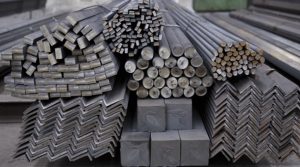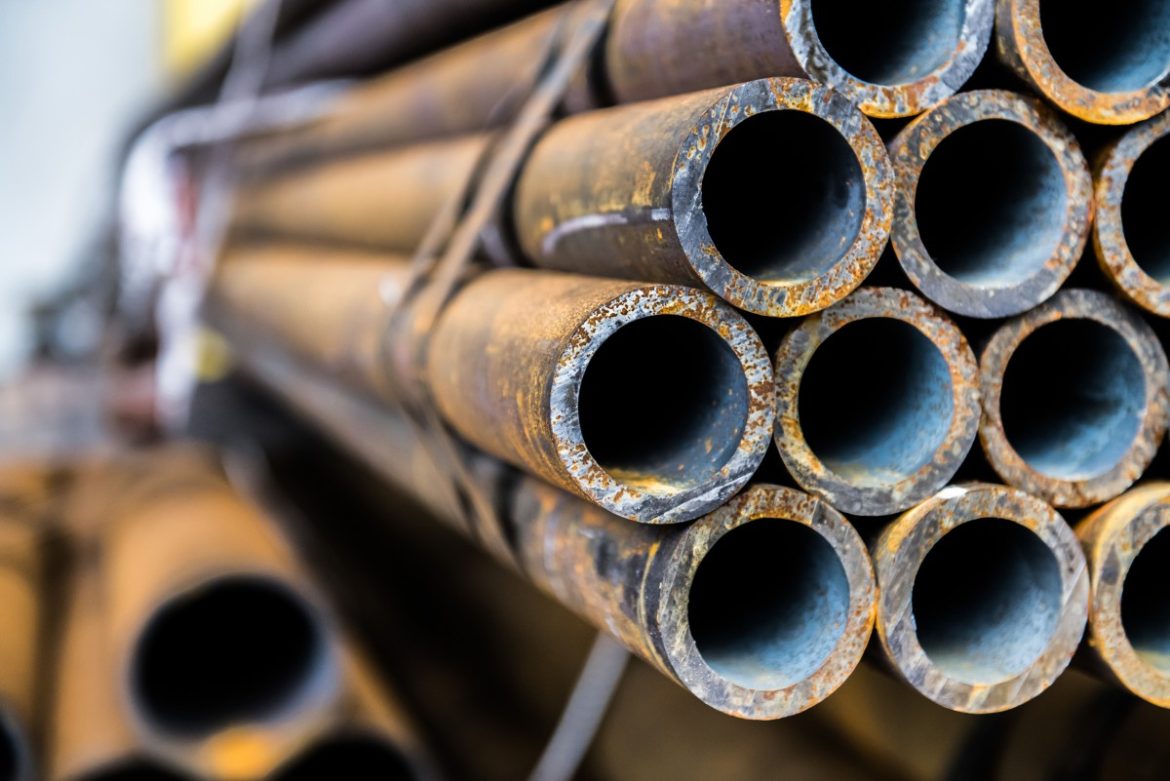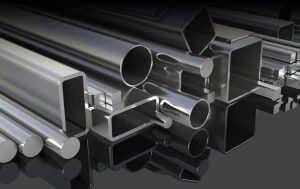Rolled steel long products
 Steel power productsSteel secondary products
Steel power productsSteel secondary products What are flat steel products
What are flat steel products
There are in rolled steel long products include hot rolled rebar, rebar, rail, wire, rope, (string wire) woven fabric of steel wire, billets, and bloom and other. The main markets of these products are construction, mechanical engineering, energy, and automobile. Further the different shapes of rolled steel are as follows. Angle, channel section, section I, flat bars, corrugated sheet, expanded metal, plates, mechanical heat treatment rods, welded wire fabrics. Rolling is the making of a material – ingots or blooms in the case of long-rolled hot-rolled mills – through two rolls that rotate at the same speed but in opposite rotations, with the aim of reducing the cross-section of the material by pressure. Applied by rolls. In the previous step, the ingot must be homogenized to a certain temperature, the rolling temperature, in a reheating furnace. And there are Two main types of installation can be found in Long Product Rolling. Continuous and discontinuous (also called cross country. The first involves rolling the rod in a continuous sense during rugged, intermediate, and milling stages. The latter involves intermittent rolling in a rough mill, usually consisting of 2-High or 3-High bases. Intermediate and complementary milling steps are performed continuously.

Rolled steel products
Hot-rolled steel, that is pressed at very high temperatures (over 1700 ° F), which is higher than the recrystallization temperature for almost steels. This facilitates the formation of steel and thus the production of products that are more diverse in appearance. The use of the rolling process has a long history. The first roller wheels were spun in the seventeenth century, although at the time they were used to roll non-ferrous products such as tin and lead, which were more malleable. At that time, the rollers were made of cast iron.
Steel long products
In the term steel industry, tall steel products or long products refer to steel products including wires, rods, rails, and rods, as well as a variety of steel structural sections and beams. The term long products may include hot rolled rebar, cold or stretched rebar, rebar, rail, wire, rope (string wire), woven fabric of steel wire, shapes (parts) such as sections U, I or H, and may also Contains continuous casting ingots, including blooms and billets. Structural units built; such parts of the bridge are also classified as tall products.
Long steel products
In the steel industry term, tall steel products or long products are referred to as steel products. long steel products are made of “blooms” or “ingots” and include rods, rod / coil sections, wires, reinforcements, nails, and seamless tubes of small diameter. Flat steel products are made of steel slabs and include plates, strips, hollow sections, large diameter welded pipes and structural beams.

Flat steel products
Flat steel products are generally known as steel sheet / coil and steel plate. They are classified into different types including hot rolled coil (HRC), cold rolled coil (CRC), metallic coated steel, organic coated steel, coil plate and reversing mill plate. When the term “flat” is used to describe steel, it refers to products that consist of steel sheets as well as steel plates. Because flat steel products are used in a wide range of applications across all industrial sectors, it is important to understand what they are and what functions and applications they offer
Coated steel products
Coated steel sheets are steel sheets with a metal and / or non-metallic coating to prevent rust and corrosion on the steel which can cause moisture and contamination on the steel. Coated steel has an extra layer of metal, paint, or both to prevent rust and wear. It is ideal for people looking for resistant, aesthetic, lightweight and inexpensive materials in industries such as construction, automotive, white goods, and other growing sectors.
Mild steel products
Mild steel is a type of carbon steel that is a low carbon content and its also called low carbon steel. “. Although the range varies depending on the source, mild steels usually have a carbon content of 0.05% to 0.25% by weight, while high carbon steels typically have a carbon content of 0.30% to 2.0%. ۔ It is stated that if more carbon is added then steel will be classified as cast iron. Mild steel is not an alloy steel and therefore does not contain large amounts of elements other than iron; You won’t find large amounts of chromium, molybdenum, or other alloys in mild steel.
Steel electric products
Silicon steel is an alloy of silicon iron with a silicon content of 3% to 5%. Divided into oriented silicon steel and non-oriented silicon steel, it is an important soft magnetic alloy required for the electrical, electron and military industries. It was a time. Known as the “expertise and ability of steel products”. Hot Rolled Silicone Steel Sheet – Open furnace and electric melting furnace with C alloy, repeated hot rolling on the sheet, finally, at 800-850% after annealing.
High carbon steel products
There are Typical applications of high carbon steels include forging grades, rail steels, spring steels (both flat and round rolled), press reinforced concrete, wire rope, tire reinforcement, wear resistant steel (plate and forging) and high strength rebar. Included. generally, high carbon steels have a temperature of 0.60 to 1.00 ٪ C with a manganese content of between 0.30 and 0.90%. Perlite has a very fine structure that makes the steel very hard. Unfortunately, this makes the steel much less brittle and less damaged than mild steel.

Low carbon steel products
Low carbon steel is the most widely used type of carbon steel. These steels usually have a carbon content of less than 0.25% by weight. They cannot be hardened by heat treatment (to make marinate), so they are usually obtained by cold work. Carbon steels are generally relatively soft and have low strength. However, they have great flexibility and are excellent for machining, welding, and low cost. High strength low alloy (HSLA) steels are also often classified as low carbon steels, but also contain other elements such as copper, nickel, vanadium, and molybdenum.
Superior steel products
Superior Steel Products manufactures steel and aluminum storage tanks such as oil tankers, aircraft fuel storages, fuel transport tanks, fertilizer storage tanks, chemical transport tanks and other products. These products are used in the petroleum, agricultural/fertilizer, chemical, fuel storage/transportation, mining, and food/beverage processing industries and in the following, we will introduce the main steel producers in the world: first company is Hyundai Steel Company; South Korean steel giant. Hyundai Steel is also a member of the Hyundai Motor Group, one of the world’s top 20 automakers. Founded in 1953 by Chang Jiang Yang, the company is today the oldest steel company in South Korea. The company currently has four steel mills, three in South Korea in Incheon, Dongjin and Pohang, and one in Changzhou, China.
Quality steel products
304 stainless steel is the most quality of stainless steel in the world due to its corrosion resistance and excellent value. 304 can resist further corrosion from oxidizing acids. This durability sanitizes the 304 and is therefore ideal for kitchen and food applications. There are many types of steel on the market today which are generally categorized into stainless steel, alloy steel, tool steel, and carbon steel. China, Japan, India, USA, Russia, South Korea, Germany, Brazil, Turkey, and Ukraine are the biggest steel producers.

Steel power products
About half of the world’s steel production belongs to China. With the difference between the European Union and India, it is in the second and third ranks. According to the statistics provided by the World Steel Association China steel products is ranked as one of the steel producers. India with 36 million tons of steel products in the first quarter of 2019 is in third place and Japan with about 33 million tons in third place. The United States, South Korea and Russia are next.
Steel secondary products
Secondary steel refers to any process that takes place after the initial production of steel. This type of steel does not have mill certification. In general, secondary steel is a cheaper choice than primary steel. It may also refer to a steel that has a defect and does not meet customer specifications. In secondary steel making, a refractory vessel is used as a furnace. The furnace is also equipped with a roof that conducts iron when heated. However, the distinguishing feature of secondary steelmaking is its use of electric arc.
Steel products weatherstrip
Weathering steel, also called core tone steel, is a group of steel alloys designed to withstand the need for coating and to provide a stable shape when exposed to perennial wind. Weathering steel has increased environmental corrosion resistance compared to other steels. Simply put, steel is allowed to rust, and rust is a protective coating that reduces future corrosion.
What are long steel products
Long steel is one of the most important components of the construction industry and its market is expanding with increasing demand for infrastructure and construction industries. Builders and construction organizations are increasingly using it to build buildings and other infrastructure projects. The long steel industry offers new growth opportunities due to new subway rail projects, dedicated lines for transportation, and repair and upgrading of highways and rail bridges.

What are flat steel products
Flat steel products consist of sheets and plates. They are rolled from slab, a semi-finished steel product. These products are used in a wide range of industries such as automotive, home appliances, shipbuilding, and construction. Now let’s see how flat products become more distinct.
Conclusion
All information mentioned above providing to the buyers who want to buy steel products and Our vision is to be a standard for customized products and quality services so that we can build a good brand image of our company in the national and international market. We are eager to do what we do and strive to further the needs of our customers by providing quality products and services. We keep ourselves updated with the latest technology and industry requirements. Protect the quality of the environment. Encourage innovation / creativity.
You can contact us to buy and sell this product:
Sales consultant: Ms. Leila Nematzadeh
Ways of communication: Phone number: 02147623014
Phone number: 02147623014
 Phone number: 04133660491
Phone number: 04133660491
 Phone number: 09120169267
Phone number: 09120169267
 WhatsApp Response (Skype): click
WhatsApp Response (Skype): click
 Instagram: simurgh_steel_company@
Instagram: simurgh_steel_company@
 email: info@simurghsteelco.com
email: info@simurghsteelco.com
 email: ironore110@gmail.com
email: ironore110@gmail.com
 Facebook: ironore110@
Facebook: ironore110@
 LinkedIn: simurgh-iron-and-steel-company-a68295180@
LinkedIn: simurgh-iron-and-steel-company-a68295180@
 twitter: CoSimurgh@
twitter: CoSimurgh@

 Call number:
Call number:  Whats app:
Whats app:  Address: Salimi industrial Park, Tabriz, IRI
Address: Salimi industrial Park, Tabriz, IRI Instagram:
Instagram:  email:
email:  Facebook:
Facebook: 








